#simulacrum and simulation
Text

true detective & "darkness on the edge of town" by bruce springsteen [on youtube]
#“this place is like somebody’s fading memory of the darkness on the end of town” —rustin cohle probably#dreamcore/nostalgiacore/liminal places/ethereal/esoteric/blood/gore/queen of the gas station/southern gothic/coquette americana/#bruce springsteen#darkness on the edge of town#cw graphic violence#sorry i felt compelled to drag baudrillard into this#simulacrum and simulation#true detective#true detective season 1#rust cohle#marty hart#rust and marty#e#my amv
310 notes
·
View notes
Photo

#when your fake living room opens up into a bunch of tiny fake bathrooms#vhs#gif#lowe's#80s interior design#1984#80s moms#80s fashion#simulacra#simulation#false reality#simulacrum
208 notes
·
View notes
Text
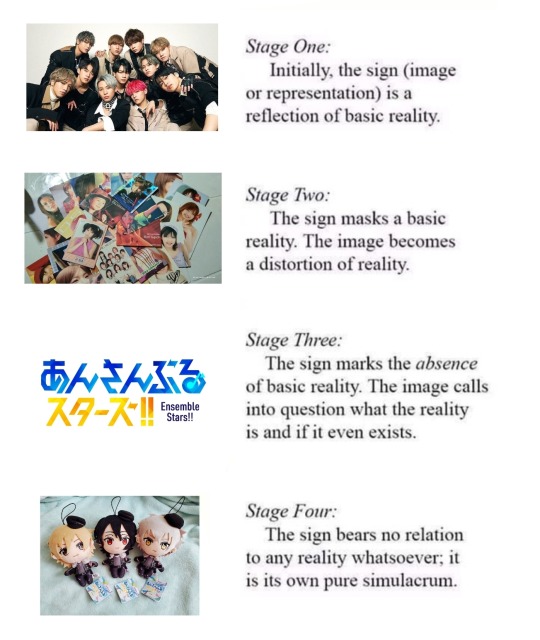
Take me to the '80s so i can explain to Baudrillard the cultural significance of idol games
#simulacra and simulation#also idk who the guys in the first pic are i just googled jpop idols#in a way thats worse#a reality where only the simulacrum is recognized anymore#of course thats only my reality but still#do feel free to give me your view of simulacra and simulation i am quite interested in the theory of it#i am a bit. well im not sure i kind of feel empty rn#so yknow. philosophy time#and enstars#always
38 notes
·
View notes
Text
over and over and over it continues to be proven that we underestimate the immense power of artifice itself to enact “real” violence. not simply a means to an end or a masking but the operative force that acts and reacts, consumes and destroys, builds and falls.
the spectacle continues to replace the real because it is not just “better than real” or “preferable to real”, it is *more real* than the real. it’s not empty, it is too full, spilling over with content.
it is important to remember that reality is a principle, a schema, and a model. reality is now insofar as it conforms to the model. economic models, scientific models, political science, sociology: these are the undergirding matrices and constituent elements of the reality principle.
once you forget this, it’s over.
3 notes
·
View notes
Text


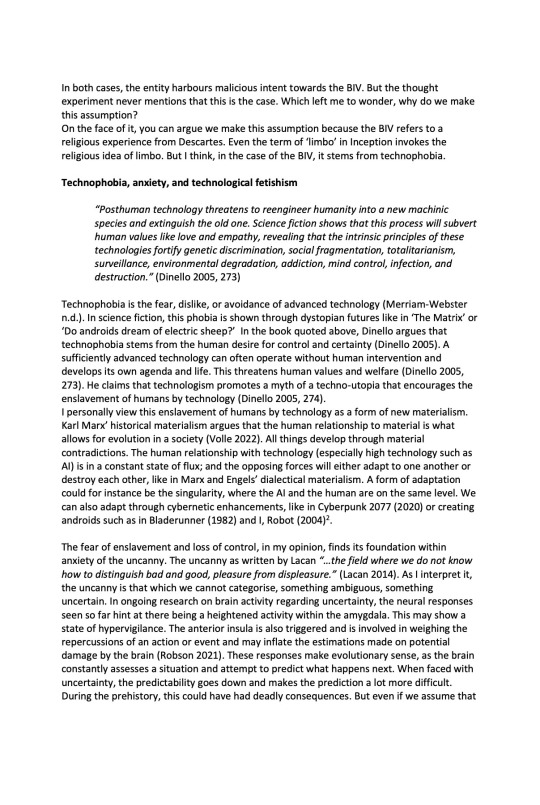


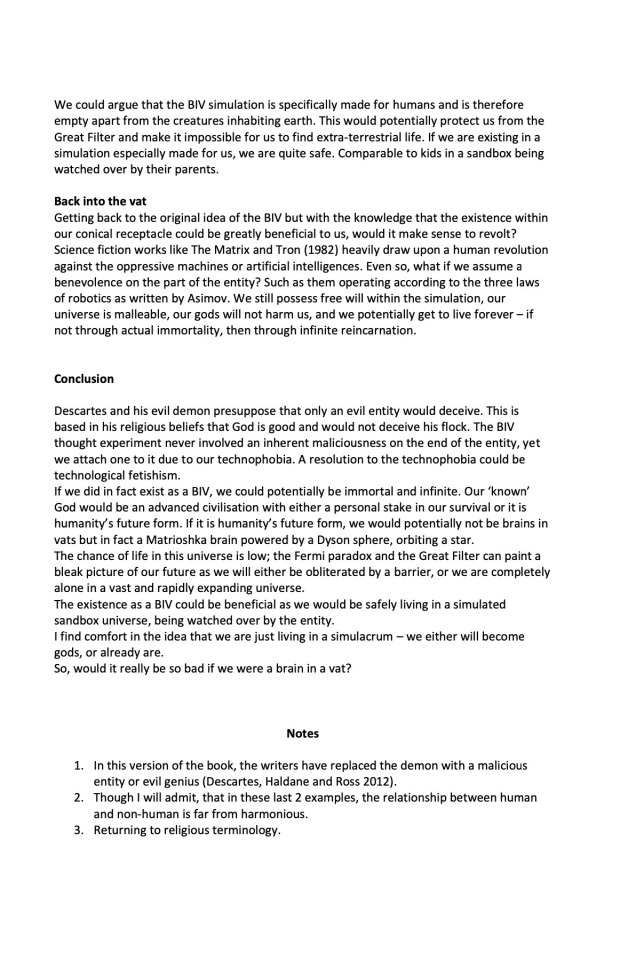
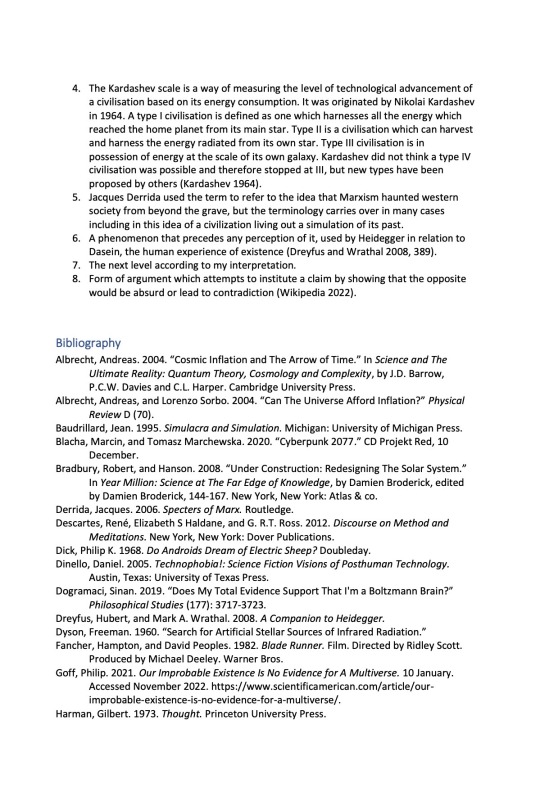

"The Brain-in-a-Vat; Technophobia, cosmology, and science-fiction"
by Daan Schoevaars
RUC University exam paper, Winter 2022
#philosophy#brain in a vat#writing#technophobia#cosmology#kardashev#matrix#bladerunner#simulacrum#simulation#virtual reality#isaac asimov#dyson sphere#jean baudrillard#descartes#benevolence#malevolence
3 notes
·
View notes
Text
WORLD ON A WIRE/ WELT AM DRAHT – PART 1, (RAINER WERNER FASSBINDER, WEST GERMANY, 1973).

View On WordPress
#Gottfried Hüngsberg#Kurt Raab#Rainer Werner Fassbinder#Scif-fi noir#Simulacrum#Simulation#Television#WELT AM DRAHT – PART 1#World on a Wire
0 notes
Text

1 note
·
View note
Note

rosekiller
it would go like
barty, excited to try something new in the bedroom, splayed out in bed completely splattered in blood lube from the collarbones down: Hey baby ;D
evan, standing by the bed with his arms crossed: baudrillard would consider it the lowest and most vulgar form of simulacrum, to replace such a fundamental aspect of our physicality— our blood, with which we used to be familiar— with this cheap imitation. meaning is becoming meaningless. your signs and signifiers are a simulation of the reality we are too docile to face. [getting a little too into infodumping] it’s the smell of your blood that i want. not this veil over my eyes. i could distinguish the taste of your blood from a crowd
barty, who had predicted & wanted this reaction from the start: [has been jerking off to evan standing over him mansplaining this entire time] hhhng oh fuck rosie what else does baudrillard say
94 notes
·
View notes
Text
so like. think abt a cyberpunk scifi story, and its about ghosts.
except when i say ghosts i dont mean like the way were used to. spirits and spectres, visitors from beyond the grave with unfinished business to resolve and all that. what i mean is, in a future where the corporate control of the internet and subsequent privacy and data sharing/selling issues are even more exasperated, not even death can protect you from exploitation.
with the physical world becoming more and more inhospitable, many people live practically their entire lives online. and after death, their various accounts immediately become forfeit and their digital footprint, everything from social media posts to search history to whatever random bits and bites they leave behind, is compiled into an advanced ai program that uses that information to simulate an entire "person", a ghost made out of data.
these post-mortum simulacrums are then sold off to the highest bidder. if youre lucky, and wealthy, you may be able to win the rights to your loved ones digital remains, to with as you will. but more likely their ghost will be recycled into whatever form is deemed most profitable appropriate, as detailed in the all powerful terms and conditions. dead artists and musicians and creatives of all kinds are fed directly into the Content Generation machine. particularly charismatic or empathetic individuals become chatbots, bringing that "human" touch to automated customer help bots and mental Wellness apps and the like. if you didnt have (or at least document) any particularly notable talent in life however, odds are your ghost will simply become one of the innumerable faceless, mindless dead mining crypto and generating random text sequences like infinite monkeys on infinite typewriters for all eternity. a modern purgatory if there ever was one.
doesnt count as a human rights violation. after all its only a reflection of a reflection, humanity as seen through a pinhole, a thin beam of refracted light. and if this assemblage of random points of data occasionally spasms out some indicator of distress, just give it a new command to keep it focused and on-task, rinse and repeat.
the person is gone. only an echo remains. but it still falls to the corporations to decide how that echo is used.
at one point a certain company collects such a large number of mathematically-minded ghosts that they are able to assemble them into a powerful probability algorithm which generates likely outcomes to nearly any given situation in real time. essentially, a bot that can see the future, and tell it to you in a cheerful synthetic voice. in theory at least. in reality, the early trials of this cutting edge technology come out a little dodgy.
sure, the subjects who interface with the bot report a high level of overall accuracy. those that are still responsive after their trials at least. the problem is, to accurately account for the extremely high number of branching outcomes that are produced by any given action, the subject needs to be communicating with a massive number of these data ghosts at once. the glitches that occur therewithin this complex operation... could be due to a number of factors. user error? hardware limitations? there must be some reason that after a stretch of time, all subjects begin to report phantom voices, whispers, things that a glorified statistics model simply shouldnt have reason to say.
more data may be required.
206 notes
·
View notes
Text
Most Trusted Advisors and Chivarly & Sorcery: Two Medieval Games with Contrasting Takes on Marginalized Identities
I think I kind of have a not-entirely-undeserved reputation over here on Tungler dot cum as "the rules-heavy RPG guy," owing to my professed love for Rolemaster, Hero System, D&D's both 3.5 and 4e, and a bunch of other extremely crunchy games. However, in what might come as a surprise to many, I don't exclusively like big crunchy games, but have been known to sometimes go absolutely Nut-Nut for games with much lighter rules text. Monsterhearts, a game of horny teenage monsters and a far cry from the 1d100 lookup tables of Rolemaster with its extremely good take on the PbtA engine, might actually be my favorite game, period.
There are two games which I have recently fallen in love with that I think exemplify my divergent tastes in RPGs: Most Trusted Advisors by @thehorizonmachine and Chivalry & Sorcery (link goes to an ongoing Bundle of Holding if you want to get in on the action!). In many ways the two games couldn't be more different: Most Trusted Advisors openly bills itself as a historically inaccurate pastiche, a theme park ride with the trappings of medieval Europe lifted from popular culture. Chivalry & Sorcery is written by people with an actual academic interest in medieval Europe and the desire to provide as authentic a simulacrum of medieval Europe as possible within the medium of role-playing games. Most Trusted Advisors is a straightforward and light system, where everything hinges on a single d6 dice pool action roll. Chivalry & Sorcery makes RuneQuest look downright pedestrian in its attempts at "realism" and goes all in on the simulation.
There is one specific place where I think the two games contrast in an interesting way, and before I dive into it: I don't think either game's approach to this matter is bad. The two approaches are very different but I think both are to be celebrated. I personally happen to prefer one of the approaches, but that doesn't mean I don't see the value in the other one as well.
Okay, ready? It's in how these two games approach queer identities.
Most Trusted Advisors is explicitly written by openly queer people. Chivalry & Sorcery is written by what I suspect are cishet allies. This I feel isn't the only reason for these variant approaches, but it provides some more context.
So, Most Trusted Advisors' approach to queer identities is basically: the middle ages in Europe, of which the game is a humorous pastiche, weren't a great time to be gay or trans. Gay and trans people did exist, but the various institutions of the time very much enshrined cisheteronormativity. As such, even when gay and trans people were absolutely there, a lot of the institutions of the time were at least somewhat hostile towards them. There were even rulers and people of note from those times who would by modern standards count as gay or trans, but they couldn't exactly be those things openly nor can we really impose modern standards on them when they wouldn't have seen things in those terms. Most Trusted Advisors' response is that the fact that the system is hostile to queer people is an acceptable part of the pastiche, and shouldn't be paved over: the game is about playing people in power and to play those people as fundamentally unsympathetic, and since they are people in power in a cisheteronormative system, they are likely beneficaries of cisheteronormativity. To make these characters queer as some form of empowerement would be very much missing the point. The point is to make fundamentally unsympathetic characters and then point and laugh at them. This is why the game doesn't have a blanket ban on queer characters, but the game's (queer) creators suggest not injecting it there.
Chivalry & Sorcery also begins with an acknowledgement of the fact that the middle ages in Europe were what could be considered a Bad Time for not only queer people but many other marginalized people. The game has a number of short essays on this topic, but ultimately falls on the side of "any prejudice these people met put aside, there are innumerable examples of people of these marginalized identities existing in Europe in the middle ages. Literally, shut the fuck up and let your players play a black person." Once again, the focus is on not paving over the fact that the setting being portrayed was not the most egalitarian of times. Whereas Most Trusted Advisors instrumentalizes this for the sake of its satire, Chivalry & Sorcery takes a different route to empowering players: it acknowledges the hardships of the time, but then says that player safety and comfort always come first, and should the group not wish to engage with the hardships of being a queer person in a medieval setting, safety tools ought to be used to allow that player to play that marginalization only to the extent they are comfortable. This is extended to all forms of marginalization, including religion, race (even though it wouldn't have been conceptualized in modern ways), gender, and sexuality.
I personally prefer the Most Trusted Advisors: many years ago I would've preferred the Chivalry & Sorcery approach, because allowing marginalized folks who feel underrepresented in certain settings to partake of the power fantasy is important. But I also think there is a lot of value in a game saying "Yeah, the system as it exists fucking sucks. You can use this game as a means to make up some horrible guys and laugh at them."
Both approaches have merit and I am glad both exist within the hobby.
39 notes
·
View notes
Text
It’s very late where I’m at (past 3 am) so I’m quite scattered but The War Games really is something magical because it not only convinced me to sit through 4 hours of Classic Who (and Classic’s pacing is smth I don’t vibe with a lot of the time) but I’m also practically convinced that it’s in the legions (Top 5 probably) of the greatest Doctor Who stories ever.
I think it’s such a pity there’s not much scholarship surrounding this episode because I’m fascinated by the means it can be approached. I think that already within the “lore” (the word makes me feel like throwing up) of Doctor Who, it’s already insanely vital. I think that its ramifications are immense, I think that as many people have covered, its plotting is kind of incredible, and of course there’s episode 10.
Yet I think there’s so much uncharted territory that is yet to be covered (Black Archives do something!!!!). I think the structure of the episodes revolving around capture/escape/capture is insanely vital for how the story is composed. If you find it repetitive (I don’t think it loses any momentum in spite of the beat feeling repetitive), I think it illustrates that very point of how, in a simulacrum of humanity at its worse, history seems to always be repeating in rhymes. But it also really emphasises the futility of the entire mission. The Doctor loses so badly because he’s out of his depth, he believes he is in control of the game when at the end of it, he’s been eclipsed, he’s left bewildered. It’s so lovely while cruelly ironic that the final speech occurs in what seems to be a parallel to the first episode’s mock trial, that it occurs with the same ambiguous beats. Perhaps both cases aren’t equivalent but neither are the capture/escape beats, yet both are so eerily similar because while the Doctor has ended that individual “game” he can’t really “win” war as a concept, as something that prevails beyond the simulation. And I think that’s very very neat.
#doctor who#classic who#second doctor#WAR GAMES!?#patrick troughton#jamie mccrimmon#zoe heriot#dw meta
26 notes
·
View notes
Text
A while after the break-up, Ari became convinced (wrongly) that their friends, family and therapist were bored of trudging with them through the mud of grief and regret and longing. They tried simply not talking about it for a while, but found the words and feelings still brewing beneath the surface like coffee gone bitter in the pot.
So they did what they often did and overengineered a solution.
The ship’s engineering crew had, on a recent away mission, picked up a few new personality modules for the Ship’s Adaptive Reality Assistant (SARA). They had been acquired on a trading station on the galactic rim, hidden in the nebula of a slow-forming star; a haven for wanderers and rogues to spread contraband.
Ari selected a module that bore a passing resemblance to their ex and began making modifications. They tweaked its appearance, adjusted its vocal range, and fed its nascent personality matrix on an archive of old messages, letters, voice memos from their ex. For good measure, they threw in the transcripts of all their imagined arguments and reconciliations too.
The result was very messy indeed (which Ari perhaps should have expected, but was nonetheless still entirely surprised by).
Quite literally messy, too, as Ari selected a charming nature walk as the location of their first simulated encounter. The pair of them ended up wrestling in a bog.
The second simulation didn’t go much better - a shouting match on a bridge that ended with Ari falling and getting stuck in a virtual silt bank.
And so it continued. Every attempt at closure ending - in increasingly unlikely series of events - with a tumble into synthetic filth.
Eventually, frustrated and covered in sticky hard light masquerading as mud, Ari asked the simulacrum outright:
“Why does it go this way? Why aren’t I better at this by now? Who programmed an inexplicable marsh behind this coffee shop simulation?”
“It goes this way because I am teaching you a lesson. I think you’ve learned it enough times now.”
“What?”
“Allow me to explain.”
It turned out, the personality module was actually a digital lifeform, who propagated their species by trading newly cracked shards of themselves as bootleg SARA software. Encoded within them, equal parts desire to help and teach, to voraciously learn, and to troll viciously.
Ari and the entity ended up becoming friends. They still correspond with each other. Occasionally, they go for long walks through simulated nature.
Here is the lesson Ari learned from this.
It is tempting, when you keep revisiting old hurts, to give up and say: I should just grieve well enough alone.
But that’s not how grief works. It’s a messy, muddy track that sucks you down into the muck. You need to keep slogging through it, again and again, until suddenly you find it is transformed into new and arable earth - ready to nurture new seeds.
And it is far harder to wade through that bog alone.
It’s like they say: people who need people are the muckiest ones of all.
26 notes
·
View notes
Text
Definitely something that struck home for me about Sar and Ozturk s Theory of the Functional Dissociation of the Self is the idea of how a 'Sociological Self' develops in absence of it's connection to the 'Psychological Self'. In fact, my final year uni project was on this very subject (I just didn't realise it at the time) on how it relates to gender, i.e. I know what my gender identity is, but where did my definition of what that identity means come from? Why do some aspects of gender feel right to me and others feel wrong?
And this extends from a much more holistic sense of who the fuck is us? Who am I? Really? At my core, what is really there that is me? What of me is truly mine? Because I've never even felt like a real person, let alone a whole person. I'm a facsimile of a person. A simulacrum in the simulation that is the world I experience.
And discovering that I was a system didn't really help with that either, am I the sum of my parts? Am I a teenage girl and a child and a vampire and a wolf and a cat boy and a 16th century Norwegian witch and a dead girl from Belgium and a crow monster and my father and my mother and my ex fiancee and so many other unique and incompatible identities? I can't be. Because they're very much not me. In fact on a very fundamental level they must not be me, that's the whole purpose of their existence, to be not me.
The way that Sar and Ozturk phrase it is that, under the pressure of an environment filled with insurmountable stresses that can't be overcome, the 'psychological self' is buried and hidden away to protect it. The 'Sociological Self' must therefore not only develop without it, but make up for it's absence. By avoiding the internal, it must rely on the external to inform it. If the immediate external environment is too harsh, which, of course it is, then it must expand it's scope beyond to wider culture and failing that, the fictional (not that culture is anything more than the fictions we collectively tell ourselves but you know what I mean). Rejected by the host, the 'Psychological Self' attempts to reach out to the world by creating new 'Sociological Selves', using the vision of the world internalised by the host as templates on how and who to be.
And this is what "less than one personality" means to me. Not a broken plate that can be put back together, or a broken mirror where all the individual pieces are still mirrors, but the result of multiple attempts to create a cohesive sense of self without full access to the entirety of human experience. Some attempts are based on lies, others on guesses, and some may be partially correct but lack context or a place to be understood and fully realised.
I'm like those old medieval drawings of animals based on descriptions of animals but having never seen them before.
This. This is me. This is what I really am. I'm like if a person didn't know what a person was and tried to make more people.
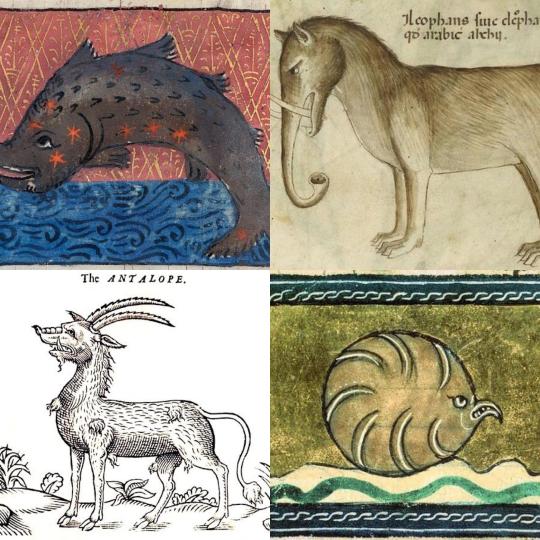
Especially bottom right, that may as well be a fucking selfie of my subconscious.
And of course I know there's a me, somewhere inside, there's a me that is me, but I can't find it, it's hidden from me. I look and I feel where it must be, but I just cannot grasp what it is. Like I kinda understand now what my IFS therapist was talking about in reference to a "core self", I now know what is meant by that, and I also know why I feel so strongly that I don't have one. Like dark matter, I can theorise about the properties of the glue that holds my galaxy together, but I cannot for the life of me detect it, I cannot interact with it, it's completely invisible, totally outside of my reach, but it's there. But it's not a whole personality either, it's not even a part of my personality, I cannot just add it to my other parts because it's isolation has left it undeveloped. Imagine asking for a dozen cupcakes and getting 11 cupcakes and a pile of flour, sugar, and egg. It's not just a missing piece, it's not even a piece yet.
And it's this, this separation and underdevelopment of the 'Psychological Self' upheld by Dissociative barriers and absolute phobia of the internal that separates my experience as a DID system from other members of the wider plural including endogenic community. I'm not going to say that this is the defining DID experience, because it's not, but it's definitely why I fail to relate to a metric fuck ton of y'alls experiences and description of yourselves, just as so many of you may tell me that you don't relate to what I'm saying right now.
And it's of course worth mentioning that this is only one way of rationalising things. It's like the oceans, we draw lines and say "this is the Pacific and this is the Atlantic" and there's value in some contexts to divide them this way and compare the differences between them, or the different layers of the atmosphere saying "this is the stratosphere and this is the flanglesphere" but it's all water and it's all air. Which way we divide it and where we draw the lines is only as important as what we're trying to achieve by doing so and the purpose that it serves.
This framework helps me to conceptualise myself the best so far, if it helps you conceptualise yourself too then you can incorporate it, if it doesn't and you have a better one then you can use that. We're all just smudges in a left handed person's handwriting at the end of the day.
#syscourse#system community#sysblr#plural community#actually did#did system#dissociative identity disorder
30 notes
·
View notes
Text
[Warning: violence, loss of self, dehumanization]
Fight. Bleed. Ignore the noise. Kill. Survive. Stay out of the fog. The fog makes it worse.
The fiend trembles with pain and rage. Bodies fall, only to flake away into purple dust that burns its eyes and eats its mind.
Don't look up. Don’t look at the void. The void looks back and sees it and is all around it and is inside it.
Its rage overflows and it burns like a blood-colored flame. It rains destruction on the simulated horde, crystalized hatred and agony pouring from the arm that doesn’t belong to it.
It might be screaming. It can't hear over the noise in its head.
The fighting stops. The red bleeds out of its vision. For a moment, it is empty and quiet and still.
Then the orb beeps and fighting starts again.
The ally is back. Freight. The fiend doesn’t have a name, but it feels right that she does. It doesn’t remember what Freight means. The jellyfish doesn’t mind. The name stuck.
She watches it fight from outside the bubble. She lingers in the fog, wrapping toxic tentacles around enemies too far for it to reach. She knows it hates to chase them out into the poisonous air. The orb accepts her kills as the fiend’s.
Pause. Follow the orb. Heal.
It goes to activate the orb again. It cannot stop it cannot stay still it must keep going. It doesn't remember why.
Freight pulls it back. Stop fighting. Rest. It squirms in her hold. Its head rings and pressure builds and its claws glow with unreleased energy.
She wraps a cool limb around its head and drapes another over its shoulders. The noise stops and the rage drains out and it can breathe. It is quiet. There is nothing alive in the simulacrum except for the fiend and Freight.
And then there is sound. Not from it. Not from the ally. Not from the orb. Somewhere else. It stands and looks out across the simulated plain. Green light cuts through the abyss, lightning arcing into the sky from a distant battle.
It stands. This is the first time it has seen anything like this. It needs to know. It brushes Freight's arms away and she follows as it throws itself into the fog.
Outside of protection, the void digs into it. It burns all the way to its heart where poison has wormed inside over days, months, years of exposure. It wrestles with the pain, forcing the corruption in reverse, healing the damage it caused. It rails against the injustice of the thing that has twisted him beyond recognition, invaded his body and mind and soul. It has become a part of him, it cannot hold him back anymore.
Freight warbles behind him as he nears his destination. A safe zone. There is another safe zone. The circle is filled with strange wriggling things that call to him. Some kind of distant familiarity. He has seen them before.
The moment of clarity is broken by the roar of a great beast. The fiend turns away from the circle and fights. It's sloppy. It can't focus on healing and battle at the same time. Freight covers his weakness, tearing apart anything that comes close with the ferocity that evades it now.
It doesn't realize when the battle is over. A voice is yelling. It has been outside for too long. Every inch of it burns. It hisses through its teeth and turns back to safety.
"Stay back."
The figure in the circle stops it dead. The source of the green light. The familiar voice. The cannons on the person's back are raised and ready to fire. It does not care. This person is not a threat.
"Maglev. Discharge."
The figure points at one of the eels drifting in lazy circles around the safe zone. The creature does not heed the order. The fiend does not move, save for its incessant trembling.
"What are you?"
It tilts its head. It was someone, once. It was someone to this man. This man is someone to it.
Who did it used to be? Who is he? He can't remember. He taps his claws on his helmet, the rhythmic sound ringing in the crack that exposed his only remaining eye to the air. For a moment, it drowns out the buzzing in his head. It is enough.
"Emmmmettt," he croaks. It's the only thing he's ever said outside of Freight's name. His voice is quiet and harsh like the death rattles of the countless creatures he has killed. The fog threatens to steal the word away from him, just as it has stolen everything else. It fails.
Emmet falters. His weapons fall back to standby and he rushes forward, dragging the fiend into the bubble. The relief is so powerful, he shudders as they cross the threshold.
"Ingo? Ingo is it really you? I can't-" Emmet babbles and holds him in his arms.
Ingo. He is not Ingo. He is Ingo. He doesn't know. Emmet decides for him.
"Have you been here this whole time?"
He doesn't understand, but he nods. He manages to whisper something that sounds vaguely like "always".
Emmet is crying. Ingo-Not-Ingo brings his left hand up and rests it on Emmet's helmet. He feels like there shouldn't be anything in the way. He should be able to touch him. But he is grateful for the barrier. His claws leave shallow scratches on the hard surface.
Emmet puts a hand over his. It's cool to the touch.
"I am Emmet. I found you. I am going to get you out."
He doesn’t know what “out” is, but he feels something when he hears the words, the conviction in Emmet's voice. For the first time since he can remember, he feels hope.
[Art by @raynavan] [First] [Previous] [Next]
#submas#risk of rain 2#ror2#ror2 void fiend#ingo#emmet#violence#dehumanization#loss of self#HOO BOY#i woke up this morning and chose violence#happy ending i promise#<- not a lie thats not my style#reunion#rae writes
55 notes
·
View notes
Text
We had gathered around a simulated fire in our holochamber. There were a number of us sharing traditional campfire songs from our various worlds, a trend so common among the galaxy you could almost compare it to eating. A lot of them were, upon reflection, the sort of things sung to children but we felt they were special to us. When it was the human's turn, a man named Sam, I was most curious what he would play. To my surprise it was a war song.
"In May of Nineteen Forty-one the war had just begun.
The Germans had the biggest ship that had the biggest guns.
The Bismarck was the fastest ship that ever sailed the seas.
On her decks were guns as big as steers and shells as big as trees."
Bare in mind the forest around the nine of us shifted to a simulacrum of an earth forest for his song. We had a good sense of an Earth tree's size.
I don't recall all the rest of the song but I do recall Chikal asking where Sam had learned it and the resulting answer. His father. His own spawner taught him how to play and sing a song about maritime warfare. I now understand the ways humans frighten a number of other inductee species.
#humans are space orcs#humans are weird#music#campfire songs#bismarck#in motion#king of the ocean#he was made to rule the waves across the seven seas#the tags are more sabaton lyrics than anything relevant#help it won't leave my brain
121 notes
·
View notes
Text
cephalon classifications
we know that Jordas & Ordis are Series-2 cephalons. Simaris & Suda are much newer. Cy is... i'm gonna guess somewhere in between these two classes. so, we have
Series-1??? Prototype?
Series-2: Orokin-style servant cephalons, with features to avoid the cephalon getting too much of an identity of its own, like mostly talking in the third person.
Railjack Cephalons: capable of first-person speech but obviously still very focused on one specific goal. need certain qualifications for this, according to Cy.
Relay Cephalons: have a fully-fledged personality and personal goals that stretch beyond their digital confinement. The only type of Cephalon whose datascape we've been in. presumably, these were volunteers to be turned cephalon in life, and have as such been allowed to retain all of their memories.
several questions.
what was the prototype cephalon series like?
what are the datascapes of non-relay cephalons like?
are there other cephalon tiers we just never hear about?
headcanons below the cut.
Prototype Cephalons
So the bare minimum requirements for a cephalon is to be smart enough to pilot an Orbiter and serve a Tenno, right? but not smart enough to rebel against the Orokin, or even give the Tenno the idea to.
i propose that the protoype cephalons were even more restricted than we see ordis being - probably like how ordis was with the vitruvian messing him up: completely depersonalised, emotionless. maybe prototype cephalons didn't even have a biological base in the first place but were pure AI. ordis with his mind-spy might've been one of the foundational/prototypical series-2 cephalons.
Datascapes
simaris' datascape is his pride and joy, and it is immense and varied, and several whole ass game mechanics happen inside of it (sanctuary onslaught, the simulacrum). compared to this, suda's datascape as we see it in octavia's anthem is almost barren, just containing the music elements. her goals do not require extensive use of her datascape like simaris' do, so her datascape is likely just for personal hanging out. it's like comparing someone's office-workspace to someone else's bedroom full of cds and a radio that belongs in a museum.
and these are two of the most advanced cephalon we meet. what does this mean for the other tiers? they might not even have datascape functionalities but i don't like that thought so i'm gonna invent something else that does make me happy.
going down tier by tier, i think railjack cephalons would be able to use a datascape for training, with or without their crew. simulating battle scenarios etc. they would need capabilities to host multiple people for these trainings.
but regular series-2 ship cephalons? the bare minimum i think would be to be able to support a 1 person training session. that would fall under the tenno support cephalon needs. maybe if multiple tenno are working together, their ship cephalons are able to work together and build a cooperative datascape to support all of them at once.
Other Cephalon Tiers
Ordis mentions there's barely any Series-2 left that he knows of. Cy mentions that he can't find a suitable railjack cephalon except for himself. We know that in-universe there are more tenno than just you, and presumably, not everyone has an identical Ordis copy. What are the odds that everyone else has a relay-tier cephalon and all of them are perfectly fine steering a ship for a tenno?
I think there is probably a tier in between series 2 and railjack, let's call it series-3, which mostly populates all other ships. if relay tier cephalons were allowed to keep their memories because they were volunteers and not otherwise a danger to the orokin empire, those were probably quite rare, and the orokin likely needed more cephalons than they had volunteers. so they would've likely sourced the biological components from undesirables if they couldn't get volunteers, similar to the warframe program.
so, after the failed series-1 and the prototypal hybrid-source series-2, the orokin perfected the single-tenno servant cephalon in series-3. i'm thinking, personality of polite-orokin-ordis, without the third-person-thing, which would make it less obvious that these cephalons still have a mind-spy-esque thing on them that would prevent rebellion.
#this is both a warframe theorypost and a worldbuilding one for my own shit#rift lore#warframe#if you have thoughts i would Love To Hear Them
56 notes
·
View notes